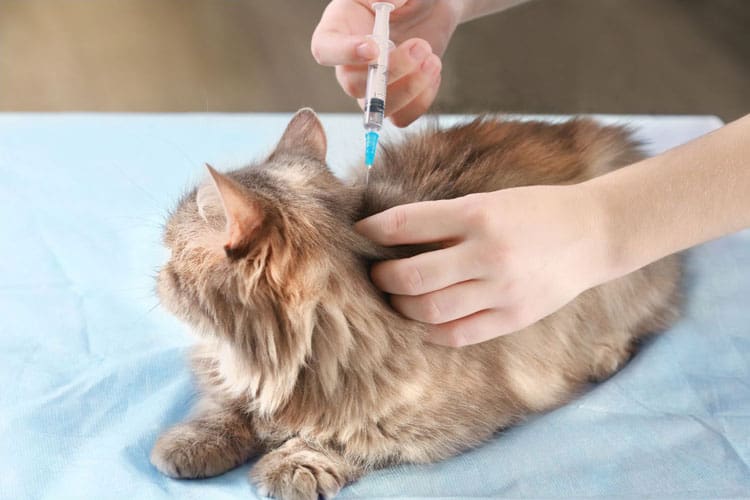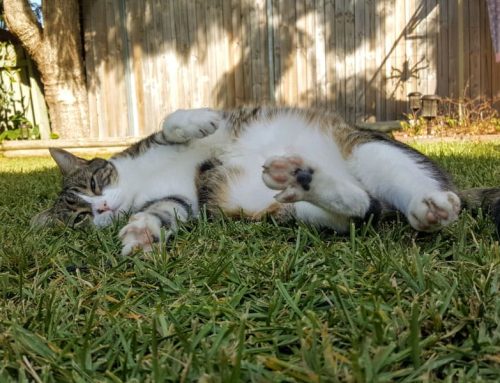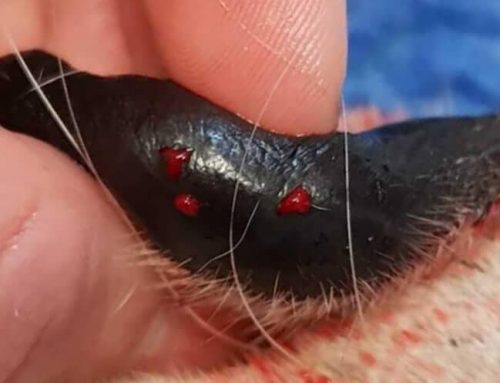Cat And Kitten Vaccination Schedules
[easy-social-share]
Vaccination is one of the most effective ways you can protect your cat against infectious diseases. There are many different vaccines available for cats, each designed to prevent certain illnesses. Some vaccines require multiple doses over a period of several weeks, while others are given once and offer lifelong immunity.
It is important to discuss with a vet your cat’s individual circumstances to determine what vaccine schedule will suit your cat best.
In this article, we will discuss the most common diseases that are prevented by vaccines, recommended vaccine schedules, costs and side effects.
Let’s get right to it.
Feline Vaccines: Benefits and Risks
Vaccines are preparations that resemble infections but are not disease-causing.
They are given to animals to help train the immune system to recognize and defend itself against those diseases, that is the body produces antibodies to fight the foreign disease and eliminate the pathogen.
It needs to be remembered that because vaccination is never 100% effective it’s important to manage our animals so that exposure to infectious agents is limited.
For cats, keeping your cat inside rather than letting them roam outside will lower their risk of catching a disease from other cats.
The benefits of vaccination include:
- protecting cats from being infected with a disease i.e. transmission of infectious disease is reduced
- reducing the severity of disease and death
- reducing the risk of transmission of disease between individual cats, and between cats and other animals including humans.
There is always risk associated with giving any medication and vaccines are no different, albeit the risk is incredibly small.
Most of the risks that we see associated with vaccines depend upon the type of vaccine used, the cat’s age, health status and individual response to the vaccine.
The side effects we see are usually due to the body’s immune system being stimulated. Thankfully, very few cats suffer from vaccine side effects.
The most common vaccine side effects we see after vaccination in cats are transient and include:
- lethargy
- fever
- injection site discomfort – heat, pain, swelling
- loss of appetite
Occasionally a cat may suffer from anaphylaxis that can occur up to 48 hours post-vaccination. Signs of this include:
- facial swelling
- vomiting
- hives
- itchiness
- diarrhea
- breathing difficulties
And very rarely, we might see adverse reactions that occur sometime later such as
- haemolytic anaemia (IMHA)
- injection site tumours (sarcoma, most often due to feline leukemia virus and rabies vaccines).
If your cat has experienced an adverse reaction to a vaccine in the past, your vet may recommend that your cat either not receive that vaccine (unless it is a legal requirement) or recommend that they receive medications to reduce the potential to react and keep your pet in for observation.
Diseases That Cat Vaccinations Protect Against
Feline Panleukopaenia (FPV)
Feline panleukopenia (FPV) is a highly contagious viral disease of cats caused by the feline parvovirus.
Kittens are most severely affected by the virus.
FPV is ubiquitous in the environment – meaning it is everywhere.
Infected cats shed the virus in their urine, stool, nasal secretions and even their fleas can aid the transmission of the virus.
Infection occurs when a susceptible cat comes into contact with these infectious secretions.
This virus attacks cells that are rapidly growing and dividing causing the symptoms we see involving the gut, foetus and bone marrow.
Feline Herpes Virus (FHV-1)
Feline herpes virus, sometimes known as feline viral rhinotracheitis (F3 FVR) is a highly contagious disease that causes upper respiratory tract disease.
Virus particles are found in saliva, nasal and tear secretions.
It is spread to susceptible cats that are in direct contact with an infected cat, or with inanimate objects (e.g., clothing, food and water dishes, furniture, toys) that have been contaminated with viral particles.
Feline Coronavirus (FCoV)
Feline coronavirus is a cat-specific virus (it cannot cause disease in other animals and is NOT the same virus that causes human coronavirus Covid-19).
This is a relatively common infection in cats that mainly causes asymptomatic infections such as enteritis resulting in diarrhoea.
Whilst most cats eliminate FCoV after infection, some will develop a persistent infection and continue to shed large amounts of the virus in their faeces, serving as a source of infection for other cats.
For some cats, the virus mutates (changes) and reacts with the cat’s immune system to create a disease called FIP.
Feline Leukaemia Virus (FeLV)
Feline leukaemia virus was once a highly prevalent disease, which now, thanks to vaccination is a lot less common.
The virus is transmitted between cats via contact with a cat’s infected saliva and urine either directly, or by touching shared food bowls and toys.
Kittens can be affected either in utero or by consuming infected mothers’ milk.
Cats with FeLV can suffer from anaemia (low red blood cell count), cancers and other diseases related to immunocompromise.
This is a progressive disease that worsens over time and can be fatal.
Rabies
Rabies in cats is caused by the rabies virus causing central nervous system dysfunction that results in a sudden change in behaviour and paralysis that worsens over time ending in death.
Transmission of rabies is via saliva usually from bite wounds.
All mammals can be affected by rabies and as such, it is a human health risk.
Feline Immunodeficiency Virus (FIV)
Feline Immunodeficiency Virus (FIV) is a virus that only infects cats. It causes a progressive disease that has no cure.
Whilst the virus belongs to a group of viruses that include human immunodeficiency virus (HIV), the cause of acquired immunodeficiency syndrome (AIDS) in humans, it is not possible for FIV to be transmitted from an infected cat to humans.
The primary route of infection of FIV is from a cat bite.
Non-aggressive play that does not cause wounds does not appear to result in transmission.
Feline Chlamydia
Feline chlamydia is a bacterial infection caused by Chlamydophila felis.
It primarily affects the eyes and upper respiratory tract, although it can progress to the lungs in severe cases causing pneumonia.
Because chlamydia doesn’t survive long outside the cat, it requires close contact between cats for transmission between them to occur. Transmission is usually via ocular secretions.
Bordetella Bronchiseptica
Bordetella bronchiseptica is a bacterial infection that can cause upper respiratory tract disease in cats.
It most commonly affects cats living in high numbers such as in rescue centres or breeding colonies.
Transmission of B. bronchiseptica between cats occurs via bacterial laden saliva or nasal secretions/sneeze droplets.
What Vaccinations Should My Cat Receive?
There are two types of vaccination categories that describe vaccine requirements:
1. Core Vaccines – vaccines against diseases that are highly prevalent and/or of public health importance.
2. Non-Core Vaccines – vaccines against diseases that may put an animal’s health at risk due to their particular lifestyle or health conditions.
Cat Core Vaccines
WSAVA (The World Small Animal Veterinary Association) recommends that all cats receive core vaccines that protect against:
- Feline panleukopenia (FPV),
- Feline herpesvirus (FHV-1)
- Feline coronavirus (FCV).
Cat Non-Core Vaccines
- Rabies – this may be a core vaccine in some countries
- Feline leukaemia virus
- Feline chlamydia
- Feline coronavirus
- Feline Bordetella bronchiseptica
Kitten Vaccination Schedule
Kittens are susceptible to a number of diseases because their immune system is not fully developed.
Although most kittens are protected by maternally derived antibodies in the first weeks of life, this can alter the ability of the kitten’s immune system to mount a response to vaccination.
For that reason, it is recommended that kittens receive their final vaccination in the series of core vaccines after 16 weeks of age.
The vaccination schedule for kittens typically begins at about 6-8 weeks of age with repeat booster vaccines given every 2–4 weeks until 16 weeks of age or older.
Because it is difficult to determine if a kitten is still affected by maternal antibodies at 16 weeks of age, another vaccine is then recommended to be given at 26 weeks of age.
Rabies vaccine is given at 14-16 weeks with a booster at 12 months of age.
If you plan to allow your kittens outside and to socialize with other cats, or attend boarding facilities or breed them, we highly recommend discussing non-core vaccine requirements with a vet.
Adult Cat Vaccination Schedule
It is important to remember that the immunity that FCV and FHV-1 vaccines provide will not match the immunity provided by FPV vaccines. In other words, it is still possible for infection and disease to occur in vaccinated adult animals.
Studies have also shown that immunity against FCV and FHV-1 disease declines at 3 years post-vaccination, so for those cats that are high risk i.e. outdoor cats, or those that mix with other cats frequently either in a multi-cat household or regularly attends a cattery to board, it is recommended that a yearly vaccine is given.
It’s also worth noting that the most protection against these diseases occurs within the first 3 months after vaccination. Therefore it is wise to provide boosters prior to an increased risk period.
Do Indoor Cats Need To Be Vaccinated?
All cats require their initial kitten vaccinations. After this, we categorise cats as either high risk or low risk.
Low-Risk Cat
A healthy indoor cat living as the sole cat in the household is deemed to be low risk.
This kitty does not require additional vaccines beyond the core vaccines (this might include rabies due to the zoonotic risk – this will depend on where you live).
For these low-risk cats, booster vaccinations every 3 years will be adequate. (Some countries/states might require a yearly rabies vaccination).
High-Risk Cat
If you have a multi-cat household, foster kittens, let your cat go outside or your cat goes to a cattery then it will be deemed a high-risk cat.
The risk of catching diseases that are easily transmitted between cats is much higher for these cats.
For this reason, annual vaccination with the core vaccines is recommended.
You may also like to consider vaccinating against FeLV and FIV and think about the other non-core diseases such as chlamydia and bordetella.
Vaccinations And Socialisation
Kittens need to be exposed to new situations and environments at an early age. This helps to prevent fearfulness and anti-social behaviour later in life.
Ten days after receiving their final cat vaccination at 16 weeks of age, it is safe to expose your kitten to outdoor adventures.
At this time you can safely allow your kitten to go outside for short periods of supervised time.
Before this, take care to always keep your kitten indoors away from other unvaccinated cats, especially those that are known to carry diseases such as feline immunodeficiency virus (FIV).
Cost Of Kitten And/Or Cat Vaccinations
The cost of vaccinating your cat can vary widely depending on where you live and what vaccines your cat requires.
In Australia, a typical fee for a routine vaccination that includes an annual health check could range anywhere from $100-$145.
Non-core vaccinations, such as those for rabies and feline leukemia virus (FeLV) will incur additional fees. If you plan on getting your kitten vaccinated against FeLV, it’s important to find out whether the vet offers this service because it’s typically offered at a separate price.
Remember that a veterinarian will perform a physical exam prior to administering any shots.
This process helps ensure that your cat/kitten doesn’t already have any health issues that require treatment.
Depending on your cat’s history and clinical exam, your veterinarian may also suggest performing additional tests prior to vaccination. These may include a blood test, urinalysis, and fecal analysis.
These tests are used to determine whether your kitten has been exposed to diseases like feline immunodeficiency virus (FIV), roundworms, and giardia.
Titre Testing
A titre test measures the levels of antibodies in your cat’s blood to determine whether it has levels that would provide enough an adequate immune response if challenged by the disease.
Titre testing for feline parvovirus has been shown to be quite robust although sensitivity is 79% and specificity is 89%. This means that some seronegative cats will actually be immune, while some seropositive cats will actually require a vaccine.
Titre testing for FHV-1 and FCV has poor efficacy.
For that reason, your decision to titre test vs vaccinate needs to be made after consultation with your vet.
Cat Vaccination Aftercare
Some kittens and cats will seem needier and may seek out your attention and affection after their vaccinations, others might hide away, while most cats will be fine and act as if nothing happened.
If you’re concerned about how your cat is doing after he or she gets vaccinated, here are some things to keep in mind:
The disruption to their normal day combined with a trip in the car can upset some cats. Keep this in mind, a change in behaviour may not be all about the vaccine.
Most cats return to normal behaviour within 24 hours of receiving their shots.
Your cat should be eating and drinking normally during this time.
If your cat seems lethargic or depressed, it’s wise to contact a vet to double-check what is happening.
[easy-social-share]







Leave A Comment